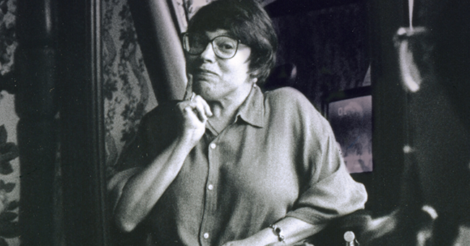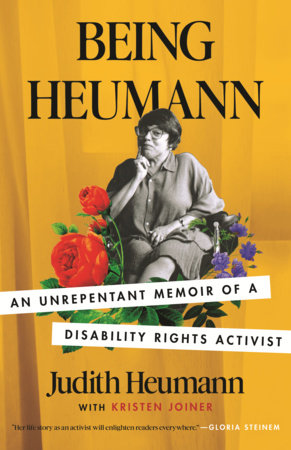By: Kristen Joiner

“So, you’ve been a feminist and worked in human rights your whole career?” Judy Heumann asked me the first time we met to discuss the possibility of writing her memoir.
“Right.”
“And you never knew disability was a civil rights issue?”
Since I’d already owned up to this, I nodded again.
“So, what makes you think you can write my story?”
I paused. Judy Heumann always invited total honesty. “Because I’ve learned I have this blind spot and I want to know why.”
“Don’t say blind spot,” she said.
So began a five-year-long conversation, which spanned a leap of faith on both our parts, growing trust, occasional arguments, tears, multiple rejections, and ultimately, two books and a pending feature film helmed by an Oscar Award-winning director. I feel enormous gratitude for the journey we took together.
Judy Heumann, who died earlier this year at the age of seventy-five, was one of the greatest civil rights leaders of our time.
Paralyzed from polio at eighteen months, Judy’s life is one story after another of being blocked from society. First banned from elementary school for being a fire hazard, she was nearly barred from high school, then denied a teaching license when, against all odds, she graduated from university with all the required credentials. These are just a few of the more major affronts she faced, among millions of other daily barriers and invisible cuts.
The daughter of Holocaust survivors, Judy grew up watching the Freedom Marches on television. Her closest friends were other disabled children she met in the segregated world of disability programs. Influenced by the Civil Rights Movement, she and her friends were the first to name their segregation for what it was: discrimination.
But being left out of the world didn’t make Judy and her friends feel they didn’t belong; it made them angry.
In 1977, Judy and activist Kitty Cone led what is now known as the Section 504 Sit-In, the longest peaceful takeover of a federal building in US history. Which then paved the way for the Americans with Disabilities Act.
Yet, when my agent asked me if I’d like to work with Judy Heumann on her memoir, not only did I have no idea who Judy was, I initially dismissed the project. I thought (and recap: I’d spent my career working for social change) it sounded boring. Not until I looked deeper into Judy’s story did I realize how staggeringly significant her life was.
Later, I’d see this reaction as my first insight into what ableism, or discrimination against people with disabilities, can feel like from the inside.
I wasn’t alone. When our agent went to publishers to sell our book, we got multiple rejections. While many editors praised Judy’s accomplishments, they confessed a fear that her story wasn’t “compelling enough.”
The truth is, on the surface, ableism can look and feel quite benign—for the perpetrator. Discrimination doesn’t have to be malicious. It can be a simple dismissal. A split-second judgement about whose story is deemed “interesting.” In 2016, the Annenberg School found that less than three percent of the characters in the top 100 highest earning movies were portrayed as disabled, even though twenty-six percent of Americans have a disability, according to the Centers for Disease Control.
Discrimination dismisses, diminishes, and ignores.
I shared this with Judy as part of our ongoing conversation about discrimination: how it looked and felt on my side as a nondisabled person, and how it had looked and felt on her side for her entire life.
Then, we confronted another engrained belief. As a Gen Xer, I’d grown up with little faith in government. I couldn’t understand the time and trust she’d invested in activism.
“What made you focus on changing policy?” I asked her. “After the Holocaust, how did you have any faith in government at all?”
Judy answered without hesitation: “My parents believed in democracy because they had experienced what life was like without it.”
At this, something had clicked: Democratic government is purpose-built to represent every single person’s voice. In fact, it’s the only vehicle we have.
For people ignored and dismissed by society, what other better vehicle do we have for comprehensive, wide-reaching social change? For the first time in my life perhaps, I grasped the true value and potential of democracy.
Judy, the daughter of refugees, had appreciated this. I, a multi-generation American, had taken it for granted.
But then another internal struggle, on my part: “How did you not give up?” I asked. “How did you sustain your belief in activism when the government kept ignoring you?”
She’d thought about this for a moment. Then said: “I never once expected it to be easy.”
Among all the many lessons I learned from Judy Heumann, this might be one of the greatest.
Despite all she’d faced, she never succumbed to cynicism. She never lost faith—not in herself or her fellow activists, and not in our democratic government. She never stopped being an activist, even at age seventy-five.
Because she had never expected it to be easy.
As I got to know Judy’s story, my awe at what she had accomplished increased exponentially, and I became convinced of the enormous power that activism holds.
Watching my kids grow up in a world where the threat of authoritarianism continues to rise, where the rights of many continue to be under attack—from people with disabilities, to trans people, to women—the lessons that Judy Heumann offers us are more important than ever before.
About the Author
Kristen Joiner is a writer, entrepreneur, and leader in the global nonprofit and social change sector. Her writing on empowerment, inclusion and human rights has been published in numerous outlets including the Stanford Social Innovation Review, Ms. Magazine, and The Spin Off. She co-wrote Judy Heumann’s memoir, Being Heumann, and its young-adult adaptation, Rolling Warrior. Connect with her on Twitter (@kristenjoiner).
In November, 2021, we were honored to have Judith join us at a special virtual event for Common Reading:






